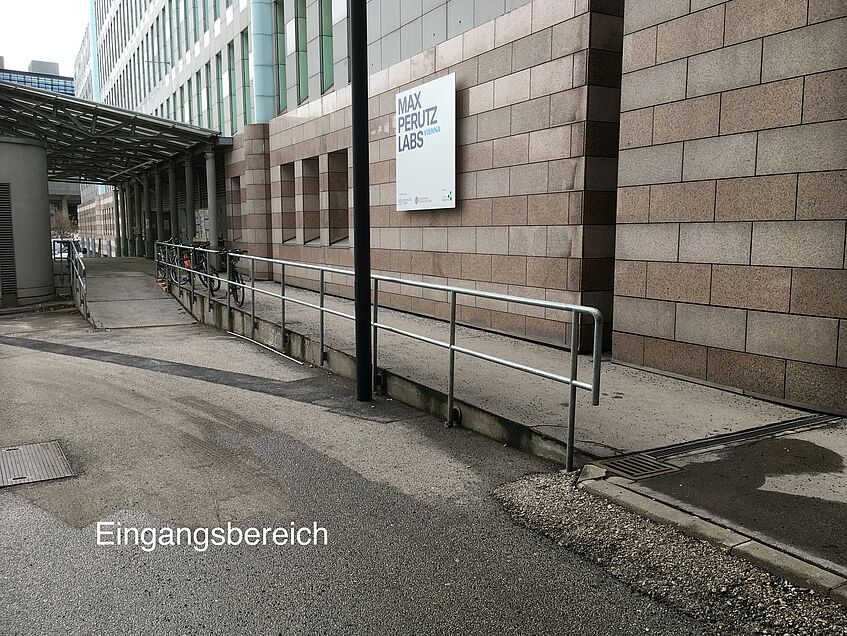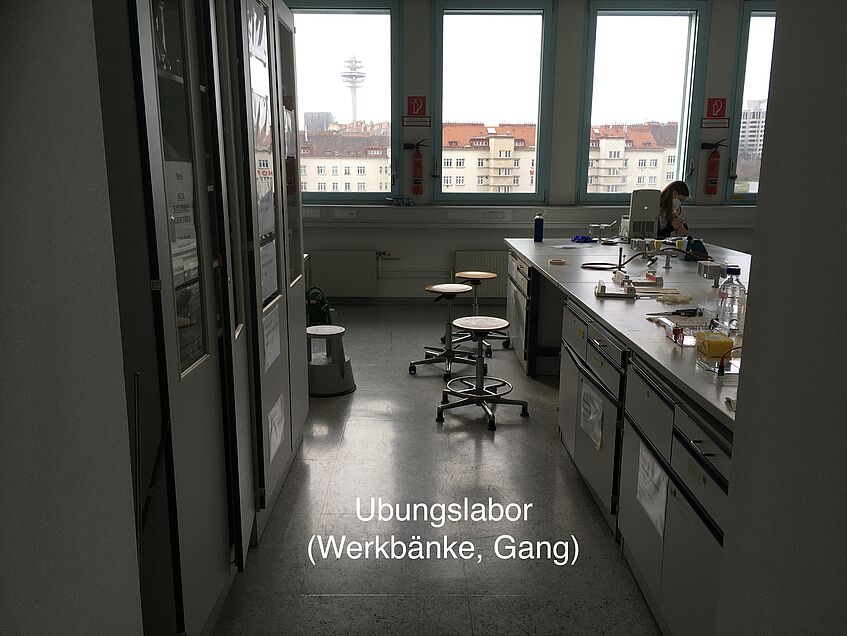Health and Safety
Lab safety
The safety regulations apply to all persons present in the laboratories/workshops, regardless of whether they are employees, students, other members of the University of Vienna, guests or employees of external companies.
The following general safety rules apply in all teaching labs:
- Working alone, especially in the teaching labs, is not allowed
Lab work is associated with an increased risk of accidents, and immediate assistance may be required anytime. Therefore, another person must be present within sight and shouting distance. When working outside of business hours or on weekends, measures must be taken to ensure adequate monitoring and effective safety measures so that first aid is provided in an acceptable time, should an accident occur. If this is not possible, working alone is prohibited - Eating, drinking and smoking in labs and workshop area is prohibited
- Lab coats and other relevant personal protective equipment must be worn
Gloves, laboratory coats and other personal protective equipment must be removed when leaving the laboratory. Wearing shorts, miniskirts or open-toe shoes is not allowed - Lab waste must never be disposed of in the general household waste
Chemical and biological waste must be collected and disposed of according to its hazard class - Know the location of and how to use emergency equipment
The audible and visible alarm devices must be guaranteed in all laboratory and workshop rooms at all times. Playing music out loud or listening to music with headphones or earphones on is not permitted. Possible hazards and risks must be assessed before work begins - All accidents - without exception - must be immediately reported to the instructor!
All persons working in the laboratories must behave in such a way that hazards are avoided to the best extent possible. In case of high-risk works, people working in the immediate vicinity must be informed
The Employee Protection Act, Fire safety rules as well as the internal House Rule of the University of Vienna are the legal background of the general lab safety rules.
Maternity protection
The Maternity Protection Act applies to pregnant employees and breastfeeding mothers (students and employees of the University of Vienna). Working with any biological or any dangerous agents or in presence of ionizing radiation or other hazards according to § 4 paragraph 2 is prohibited. Pregnant employees and breastfeeding mothers are obliged to discuss the relevant risks with the doctor. If there is a potential risk, participation in laboratory/workshop operations or internships is not permitted.
If you have a serious medical condition so that working in the lab could affect your health or safety, please notify your course instructor or SPL prior to the course or lab placement!
Accessible studies

Entrance to Doktor-Bohr Gasse 9

Teaching labs at Doktor-Bohr Gasse 9
Accessible studies
Doktor-Bohr Gasse 9
The lecture halls and teaching labs are located on the 6th floor of the building at Doktor-Bohr Gasse 9. The entrance area has a ramp that is suitable for a wheelchair. The elevator doors are ~0.8 m wide; freight elevator doors are > 1.2 m wide. The entrance doors to the lecture halls and teaching labs are normally 0.75 m wide, but can easily be opened up to 1.1 m wide. There are two wheelchair-accessible restrooms on the 6th floor.
Teaching labs have 1.2-1.5 m-wide aisles. Laboratory workbenches are 0.9 m high; hands should reach ~0.5-0.7 m toward the center of the benches. If required, a low table with increased reach could be organized - please contact SPL or the responsible course head in advance!
In practical courses, one has to be able to reach the reagents or devices that are on a higher (1.2 m and above) level (e.g., upper shelves in the reagent cabinets, benchtop centrifuges or shakers in the 37°C room). We can bring most of these to a lower level before start of the course (please contact the SPL or the responsible course head in advance!). The practical exercises require fine hand motor skills (to operate micropipettes, open and close test tubes, weigh reagents, pick up bacterial colonies, etc.). Handling heavy objects is not usually required. The heaviest items are of the order of 1-2 kg.
The following hazard categories are relevant for the practical courses: fire hazards (Bunsen burners), electrical hazards (electrical devices), chemical hazards (corrosive, toxic and/or irritating substances are used in several exercises), health and environmental hazards, physical hazards (cryogenics, hotplates, use of sharp objects). Safety instructions are given before the practicals and on site.
In the event of an emergency evacuation, the elevators will not be available. However, the teaching labs are in the immediate vicinity of two wide stairwells (not suitable for wheelchair users); an evacuation would require assistance. However, most emergency equipment is within easy reach.
